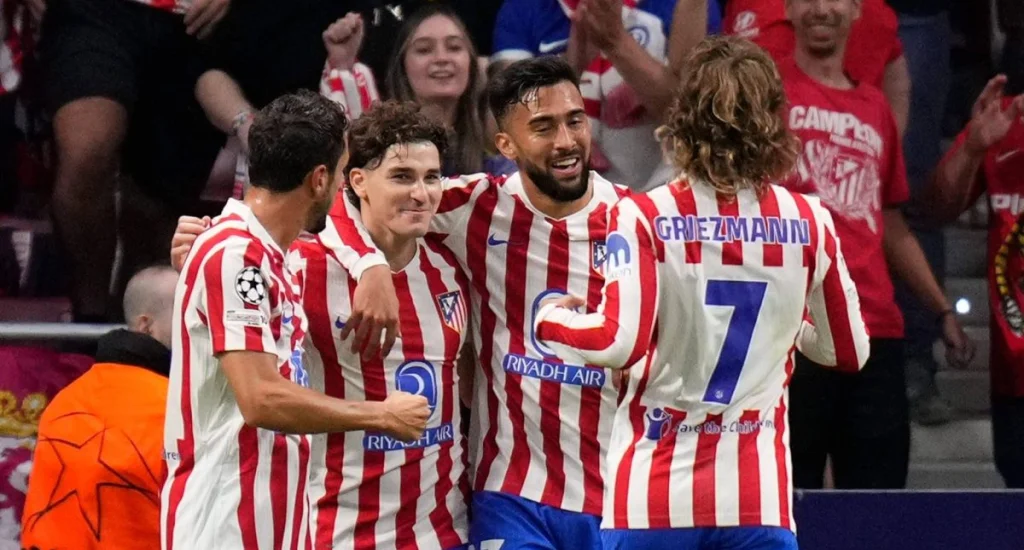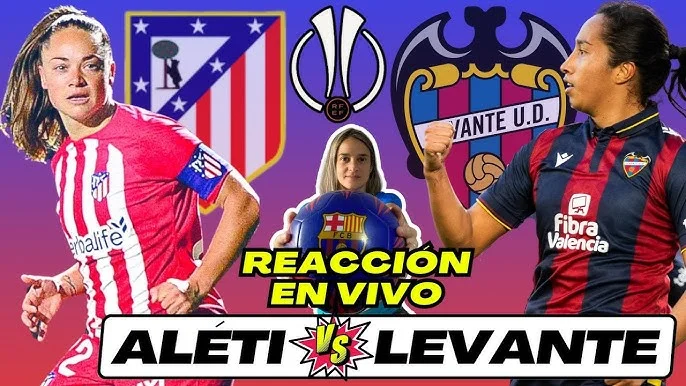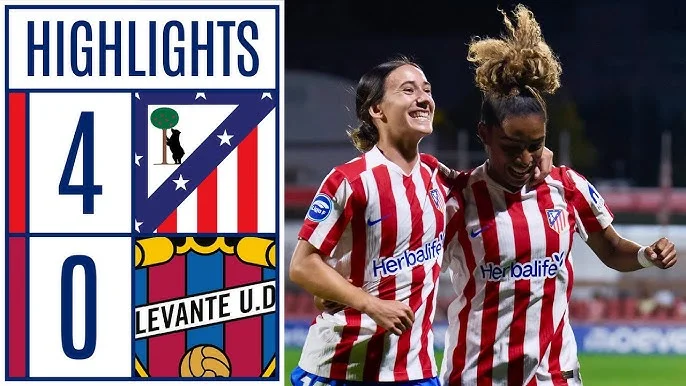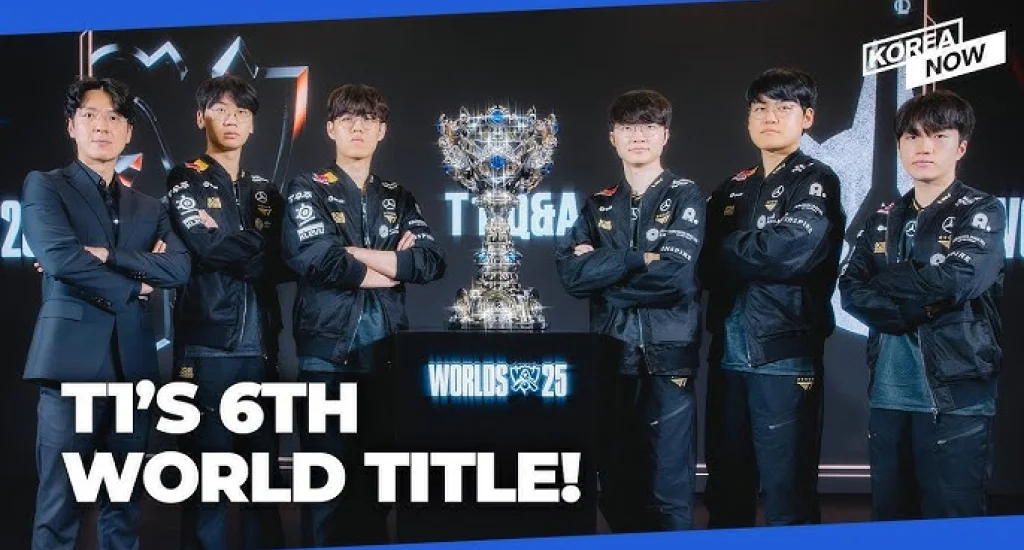
Atlético Madrid - Levante: Simeone's Fortress Tests Survival
As Los Colchoneros chase a third straight home win, struggling Levante face Diego Simeone's resurgent side in LaLiga's clash of contrasts
The Riyadh Air Metropolitano prepares to host another chapter in Spanish football's endless narrative of ambition versus survival. On Saturday evening, Atlético Madrid—riding a wave of resurgent form under Diego Simeone—welcome Levante UD in a LaLiga Matchday 12 encounter that represents starkly different realities for two clubs whose seasons have taken divergent paths into the November cold.
With their sights firmly set on delivering a third consecutive victory to their fans at the Riyadh Air Metropolitano in the space of eight days, Atlético will host Levante UD at 18:30 CEST on Matchday 12 of LALIGA. For the hosts, this fixture represents an opportunity to consolidate their position among Spain's elite. For the visitors, it's a chance to prove that survival instincts can overcome overwhelming odds.

Atlético's Resurgence Under Simeone
Simeone's men head into the game on the back of consecutive home wins - 3-0 against Sevilla in LALIGA and 3-1 against Union Saint Gilloise in the UEFA Champions League. They currently sit in fourth in the table with 22 points. After a stuttering start to the campaign that raised questions about whether his methods still resonated in modern football, Los Rojiblancos have found the consistency that's defined Simeone's remarkable tenure—unbeaten in LaLiga since the opening weekend.
Atletico Madrid have won their last seven home games in all competitions—a run that speaks to the fortress mentality Simeone has cultivated at the Metropolitano over more than a decade of tactical evolution and psychological warfare. The defensive solidity that once defined his teams has returned with authority, three consecutive clean sheets in league play demonstrating that Los Colchoneros have rediscovered their identity without sacrificing attacking ambition.
Yet this isn't merely the defensive pragmatism of Atlético's past glories. Atlético Madrid last league game was a 3-0 victory over Sevilla at Riyadh Air Metropolitano, where Los Colchoneros had 47% of possession and six shots on target, while Julian Alvarez, Thiago Almada and Antoine Griezmann scored one goal each. The blend of defensive discipline and attacking fluidity suggests Simeone has evolved his tactical approach without abandoning the principles that made him one of Europe's most respected managers—a rare feat in football's age of tactical homogenization.
Giuliano Simeone's Coming-of-Age Season
Among both squads, two young players stand out for their impressive form: Giuliano Simeone and Etta Eyong, both enjoying stellar starts to the season. The Argentinian has recorded three goals and five assists across all competitions and has been named Man of the Match in three consecutive fixtures - against Betis, Sevilla and Union Saint-Gilloise.
For Diego Simeone, watching his son flourish in the red and white stripes carries emotional weight that transcends tactical considerations and statistical outputs. Giuliano hasn't inherited his father's position through nepotism—he's earned it through performances that have made him one of LaLiga's most exciting young talents, silencing critics who questioned whether he could escape his father's considerable shadow. The question of legacy adds layers to an already compelling narrative, one that resonates beyond the immediate match result and speaks to universal themes of fathers, sons, and the burden of expectation.
Similar dynamics of performance under pressure play out across professional sports. When athletes face heightened expectations and scrutiny, their responses reveal character as much as ability, transforming individual contests into broader statements about resilience, determination, and the capacity to thrive when others expect you to crumble.
Levante's Fight for Survival
Levante UD, meanwhile, are sixteenth with 9 points after a 2-1 loss to Celta last weekend. The statistics tell a harsh story: only two victories in eleven league matches, a goal difference keeping them outside the relegation zone on technicality rather than any meaningful performance gap. This isn't just a bad start—it's the kind of trajectory that ends careers and triggers institutional crisis.
An eventful first half saw the hosts reduced to 10 men when Unai Vencedor was sent off on the half-hour mark, while Etta Eyong missed a 37th-minute penalty for the hosts. That sequence against Celta—the dismissal, the missed opportunity, the late concession that sealed defeat—encapsulates Levante's season in microcosm: moments of resilience systematically undermined by critical errors, fighting spirit proving insufficient to overcome structural disadvantages both tactical and psychological.
Yet Julian Calero's side hasn't surrendered to the mathematics of relegation. Levante are unbeaten in four head-to-head La Liga games against their hosts (two wins)—a historical anomaly that offers fragile hope to traveling supporters who've endured a season of disappointments. Recent history between these clubs defies current form, suggesting that football's narrative doesn't always follow expected scripts written by form guides and betting markets.
The Cameroonian forward Etta Eyong represents Levante's primary attacking threat and perhaps their best hope of salvaging something from Saturday's fixture. Despite the team's collective struggles, he's accumulated nine goal involvements across eleven LaLiga appearances, proof that individual quality can shine even within collective difficulty. His performance on Saturday will largely determine whether Levante can salvage anything from their visit to Madrid's formidable southern fortress—whether they leave with dignity intact or suffer another demoralizing defeat that pushes them deeper into crisis.
Tactical Considerations and Team News
The hosts have been dealt a major setback with defender Robin Le Normand expected to be sidelined for several weeks due to a serious knee injury he sustained during Atletico's Champions League victory over Union Saint-Gilloise. Le Normand's absence forces tactical adjustments at the heart of defense, though Atlético's squad depth—assembled through years of strategic investment and savvy transfer market navigation—means they can compensate without catastrophic disruption to Simeone's preferred system.
Atletico Madrid will line up in a 4-2-3-1 formation, where Jan Oblak will be in goal. Marcos Llorente and Matteo Ruggeri should feature as the full-backs, while Jose Maria Gimenez should pair up with David Hancko in the heart of the defence. The predicted lineup reflects Simeone's evolved philosophy—blending defensive reliability with attacking ambition, using Pablo Barrios and Koke's double pivot to provide foundation for more creative players ahead while maintaining the defensive discipline that remains his tactical signature.
For Levante, the injury and suspension list compounds existing challenges in ways that would test even well-resourced clubs. Levante UD will miss out on the services of Oriol Rey, Pablo Martinez, Ivan Romero and Carlos Espi as they are injured. Unai Vencedor is suspended. The absences force Calero into selections that prioritize availability over ideal tactical fit—a luxury denied to managers fighting relegation battles where every decision carries disproportionate weight and every mistake becomes magnified through the lens of survival stakes.
These roster challenges mirror broader themes in competitive balance across professional football. When teams face mounting injuries and suspensions, the thin line between success and failure becomes even more precarious, exposing the gap between elite squads with depth and those operating on margins where a single absence can prove catastrophic.
Julian Alvarez: The Manchester City Export Thriving
Julian Alvarez is Atletico Madrid's top scorer in all competitions this season. The former Manchester City forward has 11 goal contributions in his last nine appearances across all competitions for Atletico Madrid. He has found the net in back-to-back games and will look to extend that run to three matches.
Alvarez's adaptation to Madrid represents one of the summer transfer window's most significant success stories—a narrative of redemption and vindication for a player whose considerable talents were often subordinated to system requirements at Manchester City. Operating in Erling Haaland's considerable shadow at the Etihad, his quality was acknowledged but constrained by Pep Guardiola's tactical priorities and the Norwegian striker's gravitational pull on attacking moves.
At Atlético, he's become the focal point, the player around whom attacking moves are constructed, the difference-maker in tight matches where individual quality separates victory from frustration. His partnership with Antoine Griezmann—who himself reinvented his career after Barcelona disappointment—gives Atlético tactical flexibility that few Spanish clubs can match. When both are firing in synchronicity, Los Colchoneros possess attacking quality to compete with anyone in Europe, making their inconsistent start all the more puzzling to observers who expected immediate championship contention.

The Broader Context: LaLiga's Competitive Landscape
Atlético's position—fourth with 22 points after eleven matches—places them firmly in the thick of what could develop into a compelling title race, yet realistically positions them closer to a Champions League qualification battle than genuine championship contention. Barcelona and Real Madrid remain the primary title contenders with resources and squad depth that dwarf most competitors, but the gap isn't insurmountable if Simeone's side maintains their current trajectory through the season's congested middle months.
For Levante, the mathematics are more brutal and unforgiving. Goal difference is all that is keeping Julian Calero's side outside the relegation zone. Every match becomes existential, every point precious beyond its numerical value in the standings. The psychological weight of fighting relegation affects everything—player confidence erodes with each defeat, tactical risk tolerance decreases as fear of mistakes grows, transfer market positioning for January reinforcements depends on demonstrating viability worth investing in rather than inevitable decline.
Spanish football's competitive structure creates these stark contrasts that define the league's character: elite clubs with resources to weather storms and absorb setbacks, smaller sides for whom a single bad season can trigger multi-year consequences extending far beyond sporting disappointment into economic precarity that threatens institutional survival itself.
What the Numbers Reveal
Atléti have 6 wins and 4 draws, averaging 2.0 goals from 12.7 attempts and 5.7 shots on goal. Diego Simeone's men have averaged 52.6% possession, 506.2 passes and 6.5 corners per game, conceding 0.8 goals and 3.1 corners from 9.3 attempts and 2.7 shots on goal. The statistical profile reveals a team that doesn't dominate possession in the manner of Barcelona or Real Madrid but maximizes efficiency in ways that define Simeone's entire managerial philosophy—classic defensive discipline refined for contemporary demands without sacrificing attacking threat.
Levante's numbers paint a portrait of a struggling side desperately searching for consistency: Levante have won 2, lost 5 and drawn 3, averaging 3.7 shots on goal, 10.7 attempts and 1.4 goals. The disparity in output between these sides suggests that Saturday's encounter will follow expected patterns unless Levante produce a performance that defies their season-long trends and taps into reserves of determination that statistics cannot measure or predict.
Yet statistics capture probabilities, not certainties—they describe what usually happens, not what must happen. Football's enduring appeal lies partly in its capacity for surprise, for David occasionally toppling Goliath through some combination of determination, fortune, and the sport's inherent unpredictability. Levante's recent record at the Metropolitano—two victories in recent visits—proves that form guides aren't destiny, that past success can inspire present performance even when all rational analysis suggests otherwise.
The Psychological Dimension
Although Levante won the last two trips to this stadium, Atletico Madrid have a near-perfect home record in La Liga this season, with five wins and a draw in six league matches at Riyadh Air Metropolitano. This contradiction—historical success at this specific venue versus current reality of form and quality—creates interesting psychological dynamics that could influence how both teams approach Saturday's encounter.
Does Levante's past success at this venue provide genuine confidence that can translate into belief and performance, or does it simply highlight how far they've fallen from the level that produced those victories? Does Atlético's awareness of those defeats create vulnerability and caution that Levante might exploit, or has their current form erased any lingering doubts about their capacity to dominate supposedly inferior opponents?
Simeone's experience managing psychological factors—his theatrical touchline presence isn't mere performance but calculated tactical tool for influencing referee decisions and crowd energy—gives Atlético advantages beyond tactical sophistication and superior talent. He understands intimately how to weaponize home support, how to prevent complacency when facing supposedly inferior opponents, how to maintain focus and intensity across congested fixture schedules that test squad depth and mental resilience equally.
For Calero, the challenge involves managing expectations without surrendering ambition—a delicate balance that defines relegation battles. Going to the Metropolitano seeking merely a defensive point might be pragmatic given the quality gap, but excessive defensiveness often backfires against elite opposition who can break down deep blocks through quality alone, patience, and the mathematical certainty that creating enough chances will eventually produce goals. Finding the balance between caution and courage represents the perpetual dilemma for managers in Levante's precarious position.
What's at Stake Beyond Three Points
For Atlético, victory consolidates their position among LaLiga's elite heading into the November international break—that crucial pause in the season that allows time for reflection, recovery, and tactical refinement. It maintains momentum that can carry through the season's congested middle months when fixture accumulation tests squad depth and management acumen like nothing else in the football calendar. It keeps pressure on Barcelona and Real Madrid while fending off challengers from Villarreal, Real Sociedad, and Athletic Bilbao who harbor their own ambitions of disrupting the established hierarchy.
For Levante, even a single point represents moral victory and psychological boost that transcends its numerical value in the standings. It provides tangible evidence that they can compete against superior opponents, that survival remains mathematically and psychologically possible, that the relegation battle isn't already lost before winter's harshest months arrive. It buys precious time for January reinforcements to be identified and recruited, maintains fragile fan faith that prevents the toxic atmosphere that can doom struggling clubs, preserves squad unity when panic and finger-pointing could fracture cohesion irreparably.
The asymmetry of stakes creates interesting dynamics that extend beyond the ninety minutes—Atlético expected to win but acutely aware that slip-ups against struggling sides can define seasons and derail campaigns, Levante with everything to gain and little to lose beyond further confirmation of their difficult position that everyone already acknowledges.
These broader implications reflect patterns that extend beyond Spanish football. In competitive environments across industries, the gap between success and failure often appears smaller than external observers realize, with momentum and psychology playing roles as significant as talent or resources in determining ultimate outcomes.

The Historical Context
Atlético Madrid's transformation under Simeone represents one of modern football's most remarkable institutional success stories. When he arrived in December 2011, the club was floundering in mid-table obscurity, overshadowed by their city rivals Real Madrid and lacking the identity or cohesion necessary for sustained success. Simeone didn't just implement tactics—he cultivated a mentality, forged an identity around defensive solidity and collective effort that allowed Atlético to compete with clubs possessing vastly superior financial resources.
The 2013-14 LaLiga title, won ahead of Barcelona and Real Madrid in one of the competition's most memorable seasons, validated Simeone's methods and announced Atlético's return to Spanish football's elite. Two Champions League finals reached if not won demonstrated that his approach could compete at Europe's highest level, even if ultimately falling short against Real Madrid's quality and experience in football's most prestigious club competition.
Now in his fourteenth season at the Metropolitano—an eternity in modern football's managerial merry-go-round—Simeone continues evolving while maintaining core principles. The current team blends defensive discipline with attacking fluidity in ways his earlier sides didn't, yet the mentality remains unchanged: no opponent taken lightly, no victory assumed, every match approached with intensity that borders on obsession.
Looking Forward
As Saturday evening approaches and the Metropolitano prepares to host another LaLiga encounter, the narratives converge in ways that make this more than just another routine fixture in a long season: Simeone's evolution as a manager who's transcended his original defensive identity without abandoning core principles, Giuliano's emergence from paternal shadow into legitimate star carrying his own weight, Alvarez's vindication after Manchester City frustrations, Levante's desperate fight for survival against overwhelming odds that would break lesser spirits.
The match will likely follow predictable patterns—Atlético's quality overwhelming Levante's determination, home advantage and superior resources proving decisive as they almost always do in such mismatches. The statistics, form guide, and quality gap all point toward comfortable home victory that consolidates Atlético's position while deepening Levante's crisis.
"Football's enduring appeal lies in the gap between what should happen and what actually does—in the possibility, however slim, that desperation might produce heroics that defy all rational analysis and prediction."
Yet football's enduring appeal lies partly in the possibility, however slim in this instance, that David's sling might find its mark, that desperation might produce heroics that defy all rational analysis, that the script might be rewritten by players who refuse to accept their assigned roles in narratives written by form guides, betting odds, and pundits who've seen this story before and believe they know how it ends.
For ninety minutes on Saturday, eleven players in blue and red will challenge eleven in red and white, and the outcome—however predictable or surprising—will add another chapter to Spanish football's endless story of ambition, survival, and the perpetual drama that keeps millions watching across the world, hoping and believing that this time might be different, that their team might be the one that defies expectations and rewrites the narrative everyone assumes they already know.
The Metropolitano will roar, Simeone will prowl the touchline with characteristic intensity, players will chase and compete and occasionally transcend themselves, and somewhere in that collision of preparation and improvisation, talent and determination, expectation and reality, football will once again prove why it remains the world's most compelling sport—not because outcomes are certain, but because they never quite are, no matter what the numbers say.
Related Articles



